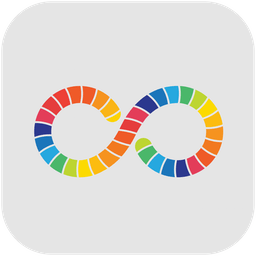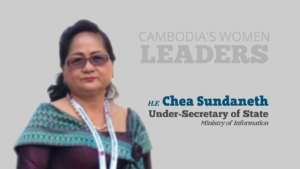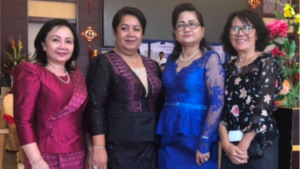This is a single part of a series of stories of 21 women leaders of Cambodia. Download the full publication here.
Give a short introduction about your life (family, education, marital status) and how has your experience been as a leader and what achievements are you most proud of?
I was born in 1958. My parents were business owners and I married a man who was a public servant and who died during the Pol Pot regime. From 1970-1975, I did my Bac II at Indra Tevy high school. Between 1979 and 1981, I worked as a protocol officer for the Kampuchea newspaper. One year later, I was appointed writer and reporter for the state newspaper. During this time, I was actively promoting media work at my organization. As a result, I was promoted to Chief of Information Bureau at the Kampuchea newspaper in 1992. I was also given a significant role in running a women’s program at UNTAC. As a talented government staff member, I was given training by international media experts at a time when there was no formal journalism education in Cambodia. With four other committed women from the media industry, I established the Women’s Radio Station of the Women’s Media Center (WMC) in 1995. It was considered the first neutral radio station in the country after the fall of the Khmer Rouge regime. The radio obtained its broadcasting license from the Ministry of Information in 1999. Our WMC received technical support from British expert Roy Head and two other American consultants. Then the national team expanded from radio to gain expertise in TV, networking, and other forms of media campaigning. In 2009, I was responsible for the directorship of the Radio-TV production department. Then, from 2011 to 2018, I was an Executive of WMC. I stopped working at WMC at the end of 2018 and I converted Women’s Radio 102 into a social enterprise, of which I am a managing director. I have contributed extensively to the promotion of democracy and women’s rights in Cambodia. I was recently assigned to be Under-Secretary of the Ministry of Information. Being a senior public servant, I am in charge of monitoring radio FM’s sub-committee. I am also involved in the Children’s Rights Committee in the Ministry. Adding to my roles, I have been appointed to be a Deputy President of the Women’s Association for Peace and Development. I am very proud of being a woman serving many Cambodian women. Women’s rights promotion is a cornerstone of my work.
When women receive leadership training, they can flourish in their business.
When you first started out with your career, what were your most significant challenges?
- Women’s families, particularly men, often do not value jobs in the media because they consider that the work is challenging as well as perilous, and does not pay well.
- Women working in the media do not have much time to spend with their families and look after household work. I am facing huge difficulties with recruiting women for my enterprise as well as at the Ministry of Information. I have to provide them with on-the-job training by myself, although some of my team can also be sent to have training abroad.
- Another challenge I face is fundraising and proposal writing. To lead the organization, I have to mobilize funding and investment to sustain its operation and future growth. On top of that, when I started my career, I did not have the leadership skills to manage many staff, both foreigners and Cambodians.
- After resigning from the NGO to set up a social enterprise in 2018, I faced many challenges in leadership and in generating income. Meanwhile, I was assigned to be Under-Secretary of State for the Ministry of Information. I have had to learn and handle all the tasks professionally.
Over the years, what valuable lessons have you learned as a leader?
- Challenge yourself and others by continuing to learn (leadership courses, financial management, change management, and so on). Over the decades, I have learned to be an effective leader who leads the complex tasks of media including radio, tv, and online contents. Meanwhile Cambodian women are still under pressure to play an important role as a good mother and wife, and to take proper care of their families. I continuously work to change traditional perceptions and to be a role model.
- Build good pools of female human capital. I am trying to recruit more young, talented women and build their capacity to advance gender equality and women’s rights in society. It proves to men that a woman can do more than they ever expected.
What are your core values and how do you ensure your team is aligned with your values?
- My core value is to work for women, whether through what I am doing privately or for the Ministry of Information. Women’s rights and gender equality are my focus. We openly and proactively promote knowledge and experience of women’s rights and ensure our team has a good understanding of our core value.
- Self-accountability and social accountability. Everyone is accountable for their performance for the benefit of the company, the Ministry, and society. We take action and produce radio programs in order to help society and the government by having a strong partnership with the private sector.
What are some of the behaviors or traits that you think are negatively impacting leadership?
- Keeping things too simple and too easy. A good leader has to be flexible in leading people. However, he or she should not be so easy and simple that followers and subordinates can do everything in the company or organization. Some rules and guidelines/ discipline have to be in place and they have to be well-enforced.
- To be too proud of what they are doing. It is a motivation to be proud of one’s achievements. However, if leaders are too proud and show off to others too much, they may miss important things being brought to their attention by their teams or others.
- Poor communication skills. Good communication is, by far, one of the most important skills for a leader. It doesn’t matter how impactful a plan the leader develops. If they cannot communicate the plan to their employees or followers in a way that is easy to understand, then the outcomes tend to be reduced.
What are you doing to continue to excel as a leader (leadership tips in doing business and promoting women’s economic empowerment or gender equality)?
- Understand the business you are managing.
- Leadership competency. Leaders have to be capable of leading people and inspiring them to complete their assigned tasks.
What are some of the biggest risks you’ve taken in your career and what were the outcomes?
- The main risk I have faced so far is the failure to recruit talented and committed staff, in particular marketing and sales people.
- The second biggest challenge has been in seeking sponsors. I have had to go about this by myself and many clients and organizations require me to work directly with them.
What makes Cambodian culture unique and how do you think Cambodia can thrive in this age of entrepreneurship & dynamic leadership?
Cambodians are friendly and innovative in facing challenges, as can been seen in the huge achievements of our Khmer Ancestors during the Angkor Wat era. We are rich in culture and geography, in the area where the largest fresh water lake in Southeast Asia exists. Cambodia has comparative advantages for businesses in the region. The government provides incentives and investments to local businesses to help maintain the annual economic growth rate of 2018, which was 7 percent. While government provides support to entrepreneurs (tax incentives, for example), it has also built the capacity of public servants to offer better public services to the general public. Equally importantly, local business owners can expand their businesses abroad and make joint business ventures with investors. Of course, entrepreneurs have to continuously learn about leadership and entrepreneurship. Their companies will be strong when they provide high-quality products and high-standard services to clients and the public. If we have more Cambodians buy and use local products, it leads to economic growth and poverty reduction.
What advice do you have for young Cambodian female entrepreneurs?
Women entrepreneurs have to be brave enough to show off their achievements and be proud to be strong women. Equally importantly, they have to contribute to society by sharing their expertise and experience with the next generations. Meanwhile, women have to seek support and attend capacity building programs to leverage their leadership skills. I notice that when women receive leadership training and other relevant business courses, they can flourish in their business and there is a noticeable change in the way they do business.
© Copyright 2019
This is a joint publication by Woomentum and Konrad Adenauer Stiftung. Download the full publication here.


